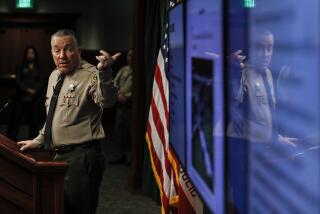‘The Body’ May Be Gone but the Spirit Will Rock On
The afternoon after Jesse Ventura was elected Minnesota’s governor in 1998, I arrived at his ranch to interview him. Sitting in his frigid barn in the first of many meetings we’d have over his term in office, a sleepless Ventura smoked a stogie, recited lines from “Jaws” and pledged to be a serious reformer. “I don’t want to cheapen the office,” Ventura told me. “I’m not about to turn it into some dog-and-pony show.”
By the time Ventura announced last Tuesday that he wouldn’t run again, his tenure seemed more like an episode of “When Animals Attack.”
Smug newspaper accounts repeated the conventional wisdom that Ventura had accomplished little and exhausted the voters. But the gloaters missed the point.
For all the spectacle that sometimes engulfed him, Ventura lifted the two-party system off its foundation, creating a new momentum toward reform--and away from old party loyalties--that ultimately helped change the balance of power in Washington. The political elites always saw Ventura as a kind of unwanted house guest, and they can hardly contain their relief at seeing him out the door. But Ventura isn’t leaving the place quite the way he found it.
At his best, Ventura offered a vision of what politics could be, of the way ordinary citizens--and especially younger citizens--could relate to the people who serve them. When he won in 1998, carrying every income group under $100,000 and every age group under 60, the state’s voter turnout ran a staggering 25 points higher than the national average.
In those early days, Ventura ignited a faith in government that my generation, born into Vietnam and Watergate, had never seen. He’d found out, he told me with surprise, that past governors hadn’t actually gone to visit employees at state agencies, and so he did. It was surreal to see longtime bureaucrats break out in spontaneous applause as the new governor strolled through the Capitol.
Ventura told audiences that he was “doing the people’s business with smiles on our faces and joy in our hearts,” and the hokey line drew long, standing ovations.
The two national parties raced to replicate Ventura’s style and rhetoric. Frank Luntz, a Republican pollster, urged clients to seem more genuine. In 2000, presidential candidates made pilgrimages to Minneapolis in search of Ventura’s blessing. (Al Gore hosted his new friend at the Naval Observatory in Washington and offered Ventura political advice on the front porch.)
John McCain calibrated his message perfectly for these new Ventura voters: conservative on fiscal and defense issues, libertarian on social issues and thoroughly unscripted. McCain’s evolution into a Ventura-style reformer enabled him to build the kind of nonpartisan movement on Capitol Hill that Ventura had envisioned for Minnesota. And it’s hard to imagine James Jeffords, the Vermont senator who bolted the Republican fold last year, putting that scarlet I next to his name had Ventura not proved that an independent could be taken seriously.
The first president elected in the post-Ventura era mimicked Ventura’s call for reform, but neither he nor most other national politicians could connect with voters as viscerally or match Ventura’s brand of political courage.
Ventura won approval for substantial property tax reform, a measure that a lot of governors--including Bush--had been unable to get through their own legislatures. And when Minnesota’s budget, like all state budgets, began to groan under the weight of recession, Ventura did what no politician ever does in this country: He came out for increasing some taxes, explaining that times had changed and sacrifices had to be made. Few politicians stood with him and few national reporters took notice.
Always, these moments were washed away by Ventura’s own pettiness and paranoia. He saw the media as an enemy. His own foolish misadventures--declaring himself opposed to organized religion, calling XFL games during the league’s mercifully short life--did in fact cheapen the office, and they enabled his detractors to treat him as a distraction from “real” politics.
Yet, aside from Bill Clinton, Ventura probably had more influence on the course of national politics than any public servant of the last decade, and it would be perilous for those of us in politics or the media to think that what he represented--this yearning for a more compelling brand of public discourse--will simply go away.
They can bury The Body, but the spirit remains.
*
Matt Bai is the national affairs correspondent for Rolling Stone magazine.
More to Read
Get the L.A. Times Politics newsletter
Deeply reported insights into legislation, politics and policy from Sacramento, Washington and beyond. In your inbox three times per week.
You may occasionally receive promotional content from the Los Angeles Times.










